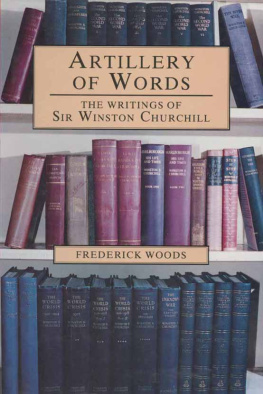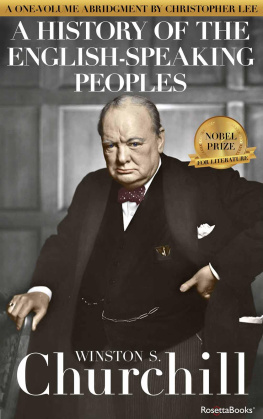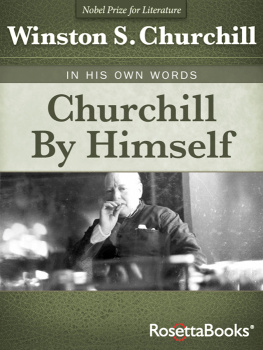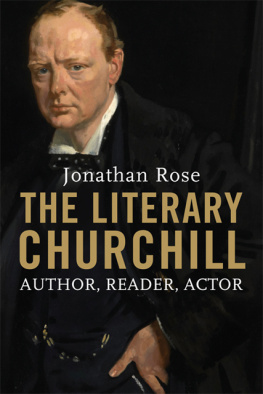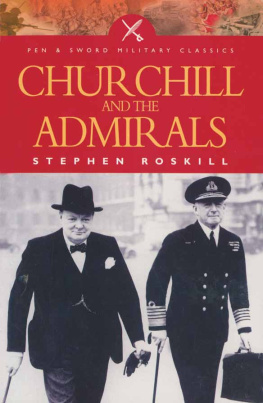First published in Great Britain in 1992 by
LEO COOPER
190 Shaftesbury Avenue, London WC2H 8JL
an imprint of
Pen & Sword Books Ltd.,
47 Church Street, Barnsley, S. Yorks S70 2AS
Copyright Frederick Woods, 1992
A CIP catalogue record for this book is available
from the British Library
ISBN 085052 298 6
Typeset by Yorkshire Web, Barnsley, South Yorkshire
in Linotron Times 10 point
Printed in Great Britain by
Redwood Press Limited
Melksham
Wiltshire
Sir Winston Churchill published fifty books, one hundred and fifty pamphlets, well over eight hundred feature articles and three short stories; he contributed forewords, introductions and articles to eighty-three other books, wrote a film script, supplied notes to a series of jigsaw puzzles about famous battles and had twenty long-play and thirty short-play records to his credit.
Both his sales and his earnings ran into millions. Few authors in the history of serious literature can have sold more copies or earned more money. He received the Nobel Prize for Literature in 1953.
Both his sales and his earnings ran into millions. Few authors in the history of serious literature can have sold more copies or earned more money. He received the Nobel Prize for Literature in 1953.
Sir Winston Churchill was only a part-time author.
In 1906, with six books already behind him, the young Churchill addressed the annual dinner of the Authors Club as follows:
Authors are the happy people in the world, whose work is pleasure. No one can set himself to the writing of a page of English composition without feeling a real pleasure in the medium in which he works, the flexibility and the profoundness of his noble mother tongue. It is a privilege to sit at a table on a sunny morning and feel that there are four hours of uninterrupted security, with plenty of white paper and a pen, away from the vexations of daily life. What does it matter to a man in that position what goes on outside his study door? The House of Commons may do what it likes, and so may the House of Lords; the American market may have its bottom knocked out; the heathen may rage in every part of the globe; Consols may fall, and the suffragists rise; but the author is secure as almost no other man is secure I have sometimes fortified myself amid the vexations, vicissitudes and uncertainties of political life by the reflection that I might find a secure line of retreat on the pleasant, peaceful and fertile country of the pen, where one need never be idle or dull.
An idyllic picture of the writers life. Probably not Churchills, however, because already his writing life was a lot more pugnacious than those of his audience. A good dinner, some good wines, an excellent cigar, a civilised ambience, a cultured audience, all these would have sparked in Churchill a vision of a literary sunlit upland. The view is essentially an escapist one, happily ignorant of the sheer struggle of writing to make a living. By 1906 Churchill was already well launched upon his career and his view of the writers life can only have been tailored for his audience. If there was one thing that he was not, it was a writer whose only pleasure was the sheer joy of writing.
In spite of his words, Churchill was never the writer in the ivory tower. Maybe he felt that vision as a subliminal tug, but for him writing was always a much more practical matter. His speech gives an altogether too placid picture of authorship as far as he was concerned, and I cannot believe that he felt any envy for those few whose lives might have been like that.
So if, in spite of his loving description of the writers life, he was not that sort of writer, what sort of writer was he?
In the year in which Churchill won the Nobel Prize, the then Managing Editor of the Daily Telegraph, Sir Colin Coote, wrote: Churchill is certainly the King of the freelances, but he is not a professional. It is difficult to see, even from the context, precisely how Sir Colin was using the world professional. In one sense it is clearly inapt, as Churchill was in his day the most highly paid writer in the history of British journalism. The statement is, therefore, presumably pejorative, implying that Churchill failed to achieve certain unspecified standards; as such it is a prime example of the curious general reluctance to grant him professional status in any field except politics.
One can also cite Professor J.H. Plumbs edgy judgment: In those fields where his work challenges comparison with professional history, Churchill remains, by the most generous assessment, a gifted amateur. It is further significant that, when Churchill was made Royal Academician Extraordinary, specific mention was made of his amateur standing.
The British are, of course, as notoriously suspicious of polymath brilliance as they are of popular success: to demonstrate the former merely evokes the phrase master of none, while to achieve the latter is to sacrifice all hope of serious consideration. And Churchill was a successful and brilliant polymath; what was worse was that he was an autodidactic polymath, which is even more suspect.
Quality was discernible in his writing as early as 1898, when his despatches from the Sudan showed a sudden maturing of an already noticeable gift. Recognition was almost immediate and continued throughout his long and varied life. Small wonder, then, that there have been instinctive reactions against such a blatantly multistranded record of success.
Certainly a blindly adulatory attitude towards Churchill does him no service whatsoever. Criticism is not only possible, it is essential. The truth inevitably lies somewhere between the heady acclaim of the wartime and immediately postwar years and the unyielding denigration that has too often opposed it. And this is as true of his writing as it is of his painting, his politics and his oratory.

